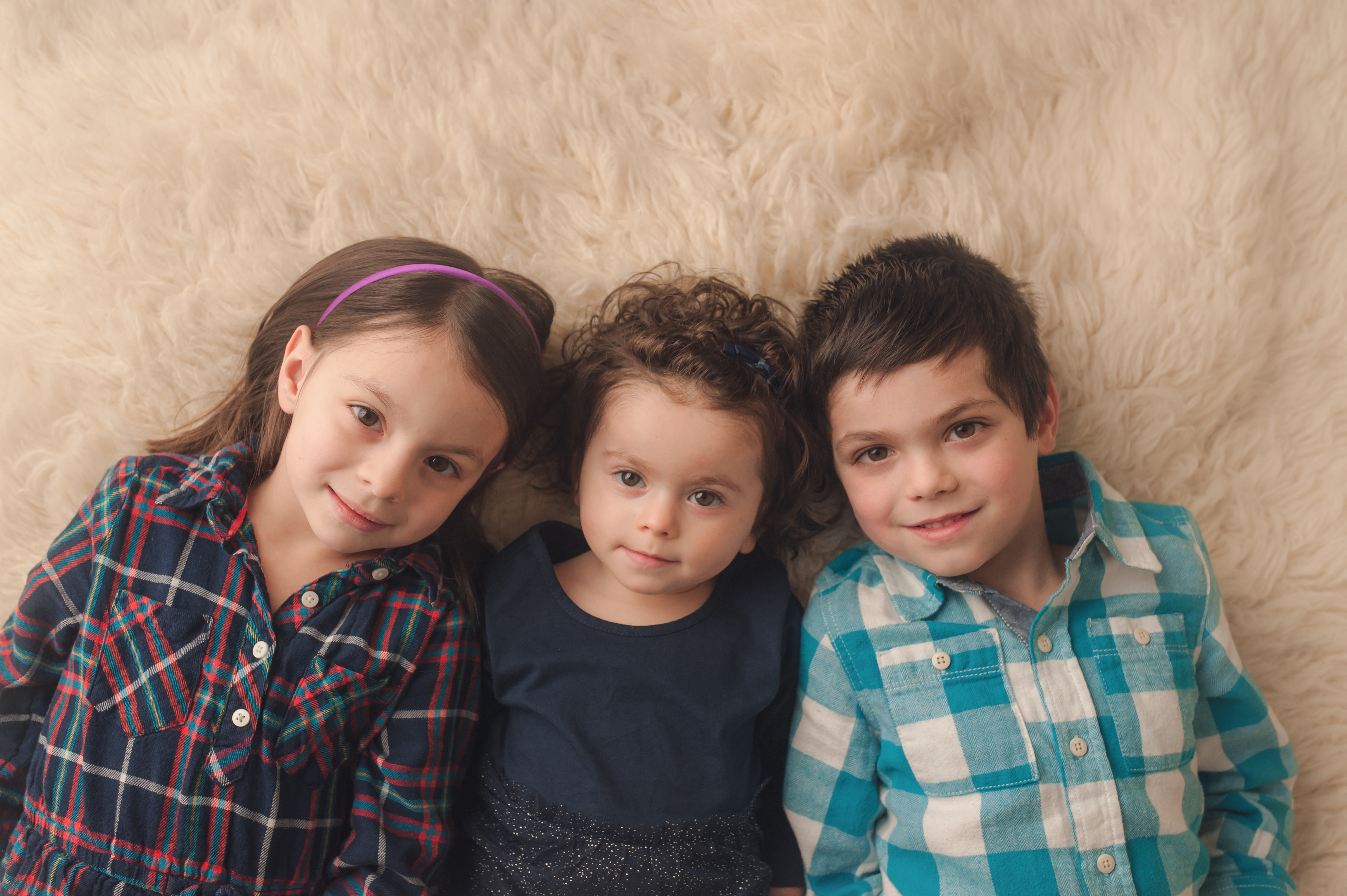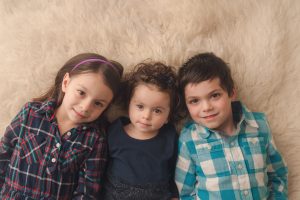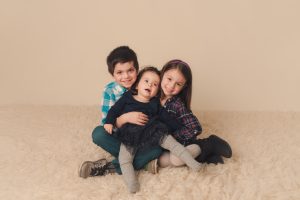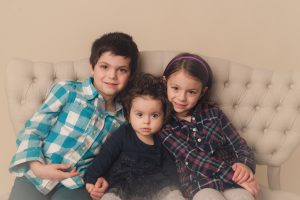4/13/2018
·Enable high contrast reading
Preparing My Other Children


When my third child, Talia, was diagnosed at 11-months-old with Tay Sachs, an always fatal neurological disease, my second thought, following my own feelings of shock, numbness and sadness, was thinking: How will my other children survive this?
I needed to find a way to prepare Nathan, 6, and Audrey, 4, to understand what death was, and prepare them for what was inevitable. They would be confronting what no child should have to know, and it was up to me, as their parent, to ready them for this challenge. I don’t believe there is a greater difficulty.
I knew that Talia, who would never mentally develop beyond that of four-month-old, would decline slowly until she died sometime before age five. The hardest part of parenting my children through this disease was the open timeline. I didn’t want to overwhelm them all at once, with what would happen – her death – and then have them be afraid to interact with their sister. I also didn’t want to make her decline the sole focus of our lives and have them come to resent her and the attention she sapped away from them.
After speaking to my palliative care doctor, and a friend who is a child psychologist, I felt prepared to begin the discussion with my kids. I have a history of speaking openly with my children. They understand where babies come from and they know they can ask me anything. I insisted on approaching this dark issue with the same openness.
We told our children that Talia had Tay Sachs Disease. We specifically said she had a disease, not that she was “sick”. We didn’t want them relating their own colds and sicknesses to a disease. We made absolutely sure that they knew the disease wasn’t contagious, and wasn’t their fault. Nathan, the older, had to be reassured more than once that he could not “catch” this disease.
“So I won’t ever get Tay Sachs?,” my son would late ask at regular intervals.
“You are safe,” we repeated.
“ Talia had a disability,” we said, “It is simply our job to love her exactly as she is.”
“I’ll give her lots of hugs,” my daughter responded.
I fought hard to remind myself that my children were very young, and when they asked questions, I tried to understand exactly what they were asking.
“Why can’t Talia hold her head up?“ Audrey would ask.
“Because she has Tay Sachs, remember?” I would reply.
I had to put my emotions on a shelf and not overwhelm them with my need to share my burden. I had to keep it simple for my kids, and instead, share my burden with my husband, parents and in-laws.
We were very clear about the disease Talia had and the limitations it placed on her body, but didn’t yet discuss the limitation it put on her life. The timeline was too open ended for them to understand. I remembered how they only “understood” my pregnancy with Talia in a real way when the baby actually arrived. Anticipating birth and death are similar for children in that they only really understand what they are seeing. With pregnancy it was my decreased stamina and growing belly. For Talia, I first wanted them to understand her decreased responsiveness and lack of development.
If Nathan or Audrey had asked about Talia’s outcome, I would have been honest with them because I would never lie to them, but I’ve found that kids ask questions when they are ready to hear the answers. Instead, my kids accepted Talia as she was, and didn’t question me much at all.
My husband and I thought of specific ways our children could have quality time with Talia while she was here. Initially it was difficult for me to encourage their sibling connection because I feared it would make the pain of their loss even greater, but helping children love each other is always the right idea. The physical memories of her siblings tickling Talia, bathing with her and helping feed her are all that now remain and when we talk about those memories, we keep apart of her alive.

Audrey came home from kindergarten one day and talked about a game where people died and then came back to life. I used it as an opportunity to directly address death, and help her understand that it isn’t something you wake up from. I didn’t overemphasize the point, just mentioned it and moved on. I then suggested that they play “go to sleep and wake up” instead.
I was also hyper vigilant about correct misconceptions about death. I heard another adult mention to my kids that death is like “going to sleep for a very, very long time.” I jumped right in and corrected her. Death CANNOT be connected to sleeping unless you want your children to fear sleep forever.
As it became clear that Talia was actively dying, I began discussing death more directly using the same plain language and openness that we had modeled throughout her sickness. “Talia’s body is going to die,” we told our kids. “The disease makes it so that her body isn’t able to work and when that happens eventually her heart will stop beating and she will die. Her soul, everything that makes her who she is, that lives on in us. Inside our hearts. Even though we won’t have her body here anymore, we will still carry her with us.”
It was only after Talia died that Nathan and Audrey seemed to understand that what we had lived through was out of the ordinary. We made sure they attended every part of the funeral and memorial to help them understand the unfathomable. I didn’t want there to be any mystery as to what was happening to Talia. I feared their imagination would conjure up something terrible, when, in fact, the actual burial was simple and beautiful.
As we approached the funeral, we didn’t want them to fear her body being underground. My husband told them a scientific truth. “All matter on this earth is made up of atoms and molecules that have been recombined in infinitely different ways since the Big Bang. Talia’s body is going to go into the earth to become part of the trees that give us air and water that makes rain and fills lakes. She’s going to be a part of everything”. He made it even more real for my son when he said, “When we skip stones across the lakes on our hikes, it will tickle the water and tickle Talia.” This was a tangible truth that our children could hold onto, and was connected to nature, and the cycle of nature of which death is an integral part.
 I would like to say that since she has died, we no longer speak about death, but it’s simply not true. My son’s teacher’s husband died in the fall, and this was yet another opportunity to talk. In their lives, as in my own, there will always be illness and death, just as there is love and beauty. As a parent, I hope I am helping them confront hardship not with denial, but with a straightforward view and open communication. As a result of our conversations around Talia, my children are better equipped to understand this world in which beauty and tragedy too often coexist.
I would like to say that since she has died, we no longer speak about death, but it’s simply not true. My son’s teacher’s husband died in the fall, and this was yet another opportunity to talk. In their lives, as in my own, there will always be illness and death, just as there is love and beauty. As a parent, I hope I am helping them confront hardship not with denial, but with a straightforward view and open communication. As a result of our conversations around Talia, my children are better equipped to understand this world in which beauty and tragedy too often coexist.


